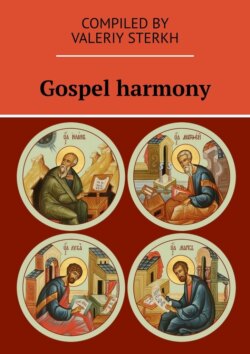Gospel harmony

Реклама. ООО «ЛитРес», ИНН: 7719571260.
Оглавление
Valeriy Sterkh. Gospel harmony
Preface
Part 1. Stating the facts
The oral Gospel tradition
The Gospel of Mark
The Gospel of Matthew
The Gospel of Luke and Acts of the Apostles
The Gospel of John
The Apocryphal Gospels
The Gospel canon
«Diatessaron» by Tatian
Other attempts to harmonize the Gospels
United Gospel
Part 2. Comparing the Gospels
The principles of harmonizing the Gospels
Genealogy of Joseph
The birth of Jesus
The Twelve
The legion of demons
The withered fig tree
Jesus arrested
Peter’s denial
The crucifixion of Jesus
The resurrection of Jesus
Jesus appears to many
Ascension
Part 3. Gospel narratives in the Acts of the Apostles
The death of Judas
The resurrection of Christ
Ascention of Jesus Christ
Part 4. Criticism going insane
The «Q source» hypothesis
Criticism of the integrity of the Gospels
The angel at Bethesda
Forgiving the woman caught in adultery
Jesus sweating blood
Jesus’ appearance at the Sea of Tiberias
The ending of Mark’s Gospel
Radical criticism of the Gospels
The author of the Gospel of Matthew
The author of the Gospel of Mark
The author of the Gospel of Luke
The author of the Gospel of John
Concluding remarks
Addendum 1. Synopsis from the Russian Bible
The sequence of Gospel events according to the four Evangelists
Addendum 2. Synopsis from the Belgian Bible
The Gospel History of Our Lord Jesus Christ (Concordance of the Four Gospels)
Addendum 3. Synopsis from the United Gospel
The sequence of evangelical events
Other books by Valeriy Sterkh
United Gospel
Apocalypse. Interpretation of the XXI century
Apocalypse. Millennium (Chiliasm and Chillegorism)
Biblical Chronology
Answers for a Jew
Отрывок из книги
Why are there four canonical Gospels? Who wrote them and when? Was there a «Q source»? Are there errors in the Gospels? Do the Gospels contradict each other? Can we compile a coherent narrative based on all the four Gospels? This book attempts to answer these questions.
At first, the word «gospel» meant the news about the approaching Kingdom of God. Jesus Christ used it in this sense when he was «proclaiming the gospel of the Kingdom» (Mt 4:23; 9:35; Mk 1:14). Later, Jesus commissioned his apostles to go and preach the Gospel (Mk 13:10; 16:15; Mt 24:14). Their preaching was oral. The apostles were sharing with the people what they had seen and heard from Jesus Christ himself.
.....
Tatian the Syrian was a disciple of Justin the Philosopher (circa 112/120 – circa 180/185), a Christian writer and apologist. By the end of his life he fell into heresy. He is most known for his book «Diatessaron» (Greek διὰ τεσσάρων, which literally means: «through the four»). It connects the four Gospels into one unified narrative which avoids repetitions and reconciles parallel passages. Sometimes it is referred to as «The Gospel from the Four». For several centuries this text was used as standard in some Christian communities, mainly in the churches of Syria and Antioch. Therefore, it is unlikely that Tatian could have written about irresolvable contradictions between the Gospels. Otherwise how could he have harmonized them? The original text of «Diatessaron» has not been preserved (only one fragment was unearthed during excavations at the archeological site of Dura-Europos in 1933). We can only guess at its contents from brief quotations in other ancient writers. For example, Theodoret of Cyprus points out that «Diatessaron» does not include Christ’s genealogies and other passages which show that Jesus came from the line of David according to the flesh. Theodoret found about two hundred copies of «Diatessaron» in his diocese, so he got rid of them and replaced them with the four canonical Gospels.
From time to time, other attempts have been made to combine the four canonical Gospels into one narrative.
.....